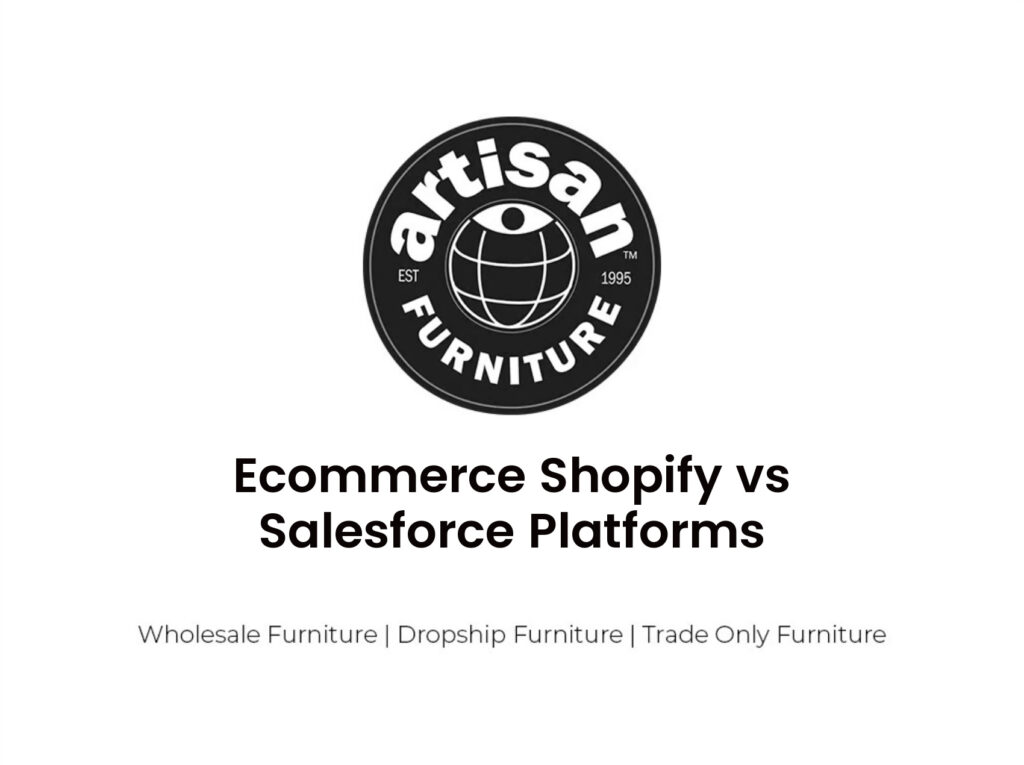Ecommerce Shopify vs Salesforce Platforms
In the ever-evolving world of ecommerce, businesses are constantly searching for powerful platforms to meet their growing needs. Enter Shopify and Salesforce, two prominent players in the field.
Offering a wide range of features and capabilities, these platforms empower businesses to thrive in the digital marketplace. From enhanced conversion rates to seamless customization options, Shopify and Salesforce provide the tools and resources needed to succeed.
Whether you’re a small startup or a large enterprise, understanding the unique advantages of each platform is crucial for maximizing ecommerce success.
Table of Contents
ToggleKey Features of Shopify for Ecommerce
One of the key features of Shopify for ecommerce is its robust inventory management system, which allows businesses to easily track and manage their products. With Shopify, wholesalers and retailers can efficiently monitor stock levels, receive real-time updates on inventory, and automate the process of restocking. This feature ensures that businesses never run out of products and can fulfill orders promptly, leading to higher customer satisfaction and increased sales.
In addition to inventory management, Shopify offers a wide range of other features that are essential for running a successful ecommerce business. These include a user-friendly website builder, secure payment processing, customizable themes and templates, SEO optimization tools, and integration with various third-party applications. Shopify also provides comprehensive analytics and reporting capabilities, allowing businesses to gain valuable insights into their sales performance, customer behavior, and marketing campaigns.
Furthermore, Shopify seamlessly integrates with Salesforce platforms, enabling businesses to synchronize their customer data, orders, and inventory between the two systems. This integration streamlines operations and enhances efficiency, making it easier for businesses to manage customer relationships, track sales, and make data-driven decisions.
Benefits of Shopify for Dropshipping
When it comes to dropshipping, Shopify offers a range of benefits that make it a popular choice for entrepreneurs.
One of the key advantages is efficient order fulfillment, as Shopify integrates with various dropshipping apps and suppliers to automate the process.
Additionally, Shopify provides a wide product selection through its extensive app marketplace, allowing dropshippers to easily find and add products to their stores.
Lastly, Shopify has low startup costs, making it accessible for those looking to start a dropshipping business without a significant upfront investment.
Efficient Order Fulfillment
The efficient order fulfillment process is one of the key benefits of using Shopify for dropshipping.
With Shopify, businesses can easily manage their inventory, track orders, and automate the shipping process.
This platform allows seamless integration with wholesalers and suppliers, enabling businesses to process and fulfill orders efficiently.
Shopify’s user-friendly interface and robust features make it easy for businesses to streamline their operations and deliver a smooth customer experience.
From order processing to shipment tracking, Shopify provides the tools and resources needed to ensure efficient order fulfillment.
Wide Product Selection
Shopify provides dropshipping businesses with the advantage of a wide range of product selection options, allowing them to offer diverse and varied merchandise to their customers. This is particularly beneficial for dropshippers who specialize in home furniture and home decor, as it enables them to curate a comprehensive collection of products in these categories.
With Shopify, dropshippers can easily source and add new products to their online stores, ensuring that they always have a fresh and appealing inventory to attract customers. The platform also offers integrations with various suppliers and marketplaces, giving dropshippers access to an extensive network of suppliers and a wider range of products to choose from.
This wide product selection capability of Shopify empowers dropshippers to cater to different customer preferences and meet the demands of a diverse customer base, ultimately driving sales and business growth.
Low Startup Costs
One of the significant benefits of Shopify for dropshipping is its low startup costs, making it an attractive option for entrepreneurs looking to start their online businesses.
When considering dropshipping, it’s essential to keep costs low, especially in the initial stages. With Shopify, you can set up your online store quickly and easily without the need for a large upfront investment.
The platform offers affordable pricing plans, allowing you to choose the one that best fits your budget. Additionally, Shopify provides access to a wide range of wholesaling suppliers, making it convenient to find the products you want to sell.
This eliminates the need for you to purchase and store inventory upfront, further reducing your startup costs. Overall, Shopify’s low startup costs make it a practical and cost-effective choice for aspiring dropshipping entrepreneurs.
Advantages of Salesforce for Wholesale Products
Several advantages of Salesforce for wholesale products make it a highly beneficial platform for businesses in this industry. One key advantage is the robust customer relationship management (CRM) capabilities that Salesforce offers. With Salesforce, businesses can effectively manage their wholesale customer accounts, track interactions, and maintain a comprehensive view of their customers’ preferences and purchasing behavior. This allows businesses to personalize their sales and marketing efforts, resulting in stronger customer relationships and increased sales.
Another advantage of Salesforce for wholesale products is its advanced reporting and analytics features. Salesforce provides businesses with powerful tools to analyze sales data, track inventory, and monitor performance metrics. This data-driven approach enables businesses to make informed decisions, identify trends, and optimize their operations for maximum efficiency and profitability.
Additionally, Salesforce offers seamless integration with other essential business tools and platforms. This integration allows businesses to streamline their workflows, automate processes, and improve overall productivity. For example, Salesforce can be integrated with inventory management systems, order fulfillment platforms, and accounting software, enabling businesses to manage their wholesale operations more efficiently.
Furthermore, Salesforce provides businesses with a highly scalable and customizable platform. Whether a business is just starting or experiencing rapid growth, Salesforce can adapt to its changing needs. Businesses can tailor Salesforce to their specific requirements, adding or modifying features and functionalities as needed.
Integrating Shopify and Salesforce for Seamless Operations
Integrating Shopify and Salesforce can provide numerous benefits for businesses looking to streamline their operations. By integrating these two platforms, businesses can improve efficiency, enhance customer experience, and gain valuable insights into their sales and marketing efforts.
This integration allows for seamless data synchronization, enabling businesses to effectively manage inventory, orders, customer information, and marketing campaigns, all in one centralized system.
Benefits of Integration
The integration of Shopify and Salesforce offers numerous benefits for businesses looking to streamline their operations and enhance efficiency. By integrating these two platforms, businesses can achieve a seamless flow of data and information between their ecommerce and customer relationship management systems.
This integration allows for real-time synchronization of customer data, order information, inventory levels, and more. With this unified view of customer data, businesses can provide personalized shopping experiences, improve customer service, and drive sales growth.
Additionally, the integration enables businesses to automate various processes, such as order fulfillment and inventory management, reducing manual tasks and minimizing errors.
Streamlining Operations With Salesforce
To streamline operations, businesses can seamlessly integrate Shopify and Salesforce, leveraging the power of both platforms for enhanced efficiency and productivity.
Salesforce is a robust CRM platform that offers a wide range of features and functionalities to manage customer relationships and sales processes.
By integrating Shopify with Salesforce, businesses can automate various tasks and workflows, such as order management, inventory tracking, and customer support. This integration allows for real-time syncing of data between both platforms, ensuring accurate and up-to-date information across the organization.
Additionally, businesses can gain valuable insights and analytics from the combined data, enabling them to make informed decisions and drive growth.
Maximizing Sales and Efficiency With Shopify and Salesforce
By leveraging the integration capabilities between Shopify and Salesforce, businesses can maximize their sales and efficiency.
Shopify is a powerful ecommerce platform that offers a range of features and capabilities for enterprise brands. It allows businesses to create unique brand experiences and offers both B2B and direct-to-consumer (DTC) capabilities.
On the other hand, Salesforce is a leading customer relationship management (CRM) platform that helps businesses manage their customer data and streamline their sales processes. When these two platforms are integrated, businesses can benefit from a seamless flow of data and a holistic view of their customers.
This integration enables businesses to personalize their marketing efforts, target the right customers with the right products, and ultimately drive more sales. Additionally, by automating various processes and workflows, businesses can improve their operational efficiency and save valuable time and resources.
With the integration of Shopify and Salesforce, businesses can optimize their sales and efficiency, leading to increased revenue and growth.
Case Studies: Success Stories With Shopify and Salesforce
Several businesses have achieved remarkable success by integrating Shopify and Salesforce platforms. These case studies serve as success stories and demonstrate the power of combining these two platforms for ecommerce businesses.
For instance, one case study showcases how a clothing retailer was able to streamline its operations and increase sales by integrating Shopify and Salesforce. By leveraging the features of both platforms, the retailer was able to drive personalized marketing campaigns, manage customer data effectively, and provide a seamless shopping experience for its customers.
Another case study highlights how a beauty brand utilized the integration of Shopify and Salesforce to enhance its customer relationship management (CRM) capabilities. This integration allowed the brand to track customer interactions, personalize marketing efforts, and improve customer retention rates.
These success stories demonstrate how integrating Shopify and Salesforce can lead to improved efficiency, increased sales, and enhanced customer satisfaction. By leveraging the strengths of each platform, businesses can create a unified and seamless ecommerce experience that drives growth and success.
Choosing the Right Ecommerce Platform: Shopify Vs. Salesforce
Evaluate the key factors to consider when comparing the ecommerce platforms of Shopify and Salesforce.
When choosing the right ecommerce platform for your business, it is important to consider several factors.
First, consider the scalability and flexibility of the platform. Shopify is known for its scalability and ability to handle high levels of traffic, making it a great choice for businesses that anticipate growth. On the other hand, Salesforce offers a robust suite of tools and features that can be customized to meet the unique needs of your business.
Second, consider the ease of use and user experience. Shopify is known for its user-friendly interface and intuitive design, making it easy for businesses to set up and manage their online stores. Salesforce, on the other hand, offers a highly customizable platform that may require more technical expertise to navigate.
Finally, consider the cost and value of each platform. Shopify offers different pricing plans to accommodate businesses of all sizes, while Salesforce tends to be more expensive and may require additional investments in customization and integration.
Ultimately, the right ecommerce platform will depend on the specific needs and goals of your business.
Frequently Asked Questions
Can Shopify Plus Be Customized to Match Our Brand’s Unique Checkout Experience?
Yes, Shopify Plus can be fully customized to match your brand’s unique checkout experience. With features like the drag-and-drop checkout editor and Shopify Functions, you have complete control over the design and deployment of personalized experiences.
Are B2B and Direct-To-Consumer Capabilities Available on Shopify Plus?
Yes, B2B and direct-to-consumer capabilities are available on Shopify Plus. Brands can run both their wholesale and DTC businesses on one platform, or create a separate B2B store. These features are exclusive to the Shopify Plus plan.
What Kind of Support and Resources Are Provided for Shopify Plus Brands?
Shopify Plus brands receive comprehensive support and resources through the Merchant Success Program. This includes access to a team of merchant success managers, insights from top global brands, and online educational resources through Shopify Plus Academy.
What Are the Benefits of Migrating to Shopify Plus From Another Platform?
Migrating to Shopify Plus from another platform offers a range of benefits, including powerful features, customization options, and B2B and DTC capabilities. Brands also receive support from a dedicated team of merchant success managers.
How Does Shopify Plus Compare to Salesforce in Terms of Ecommerce Capabilities?
Shopify Plus offers a range of powerful features and capabilities for enterprise brands, including customizable and unique brand experiences, B2B and DTC capabilities, and dedicated support from merchant success managers.



